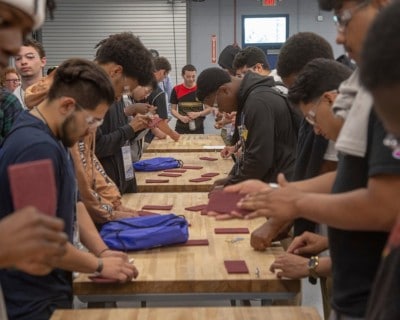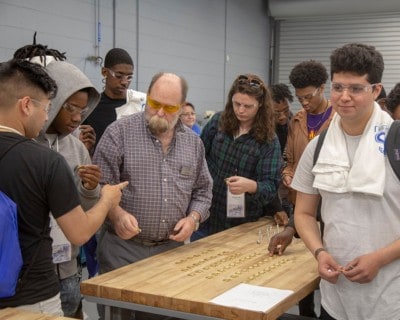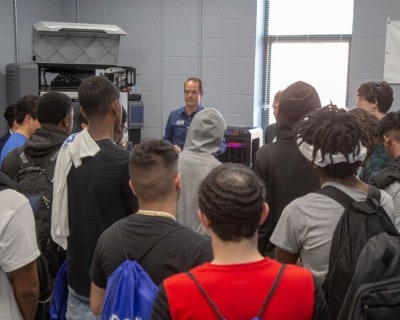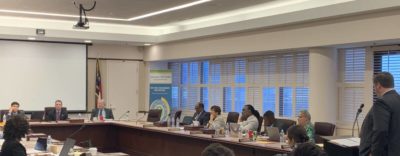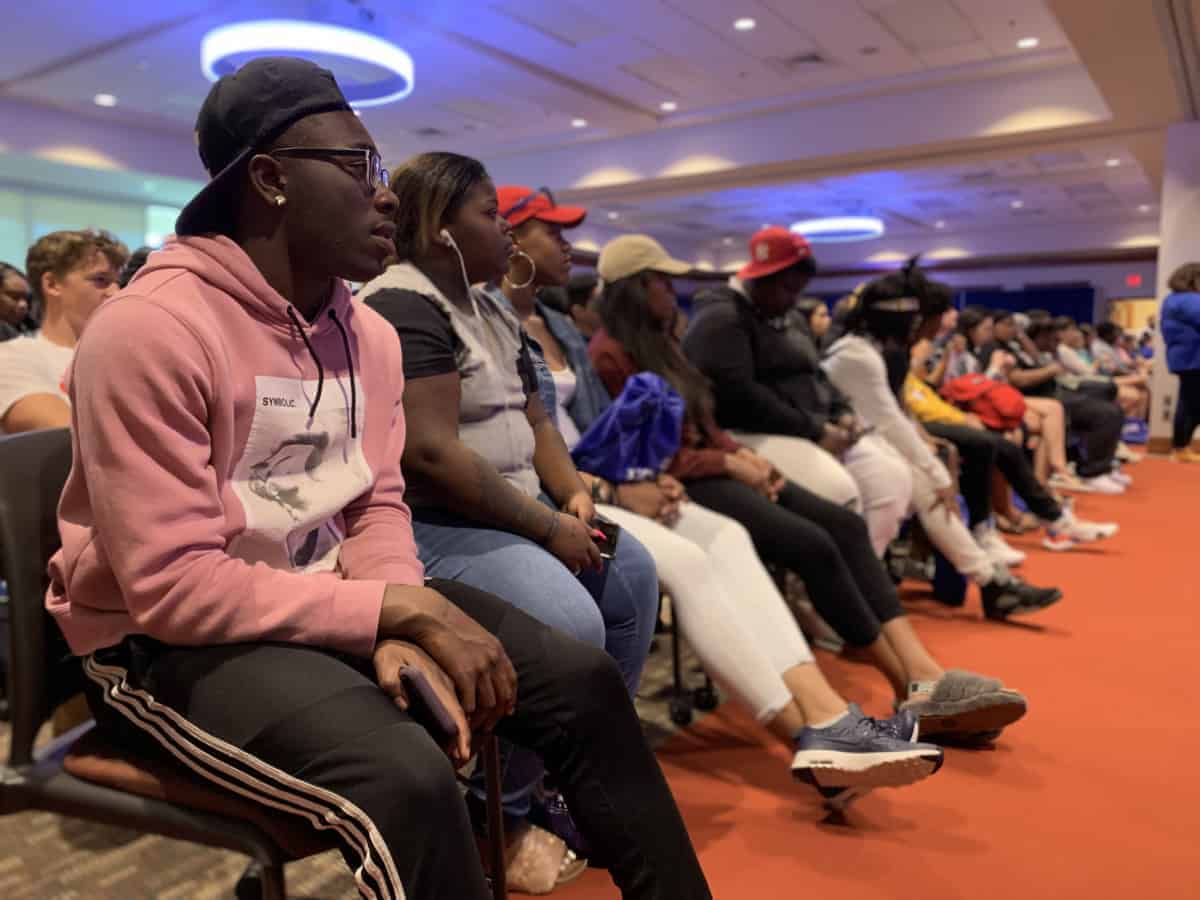

Janet Spriggs’ first order of business, after becoming the seventh president of Forsyth Technical Community College, was to meet the leaders of the community. This included Sen. Paul Lowe, D-Forsyth, who met Spriggs for lunch at the West End Cafe. Their conversation quickly turned to the large number of students who graduate high school in Forsyth County but do not attend any postsecondary institution. That number, 41% of high school graduates over the past three years, was troubling to them both.
How many of those students know the value of a community college education, they wondered? How many are aware that community college students who transfer to four-year universities tend to have higher GPAs and greater likelihood of completing their bachelor’s degree? How many were familiar with the career and technical programs at Forsyth Tech — like the cardiovascular tech degree that sees graduates of its two-year program go on to make $70,000 a year?
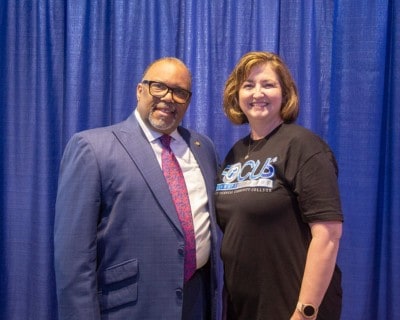

If you want a meaningful conversation like this, it would be hard to find a better suited pair than Spriggs and Lowe.
Spriggs grew up poor, she says, on a tobacco farm. She attended community college before transferring to obtain her bachelor’s in computer information systems. She was the first in her family to graduate high school, so she was already pioneering uncharted territory for her family when she went on to get a master’s, become the Chief Operating Officer at Rowan-Cabarrus Community College and, now, president of one of North Carolina’s largest community colleges. And it all started — she’ll remind you — with the community college system.
The example of life-changing value and opportunity through community college education was passed down to Lowe through his mother, who attended community college before transferring for a bachelor’s degree, becoming a teacher, and getting her master’s.
At a time when many high school students are surrounded by adults in their schools who have four-year and advanced degrees, stigma can attach to those who choose to pursue a community college education. So as the pair sat at West End that afternoon, they became increasingly determined to focus on the 41%, and, as Spriggs said, especially the “marginalized populations, low-income students — students who don’t have the role models in their life to help them understand what college can do for them and that their future can be different from what they only ever have been able to see , which is very narrow and limited.”
Lowe looked across the table and asked, “Well, what can you do?”
“We’ve got to get the students to see what we’ve got to offer,” she said.
Spriggs and her team reached out to local district superintendents, who looped in guidance counselors and administrators from every school. They acknowledged that many of the area high school students already had a plan for their future; many had already accepted invitations to four-year universities.
“I don’t want you to send them to us,” Spriggs told them. She asked for the students who did not yet have a plan. And so the schools gave the students an option — not a requirement — to attend the event called Focus on Forsyth. They hoped to get as many as possible, knowing that the most high school students they had ever gotten on campus for an event was 300.
Fast forward several months, and Spriggs stood on stage addressing a sea of more than 700 seniors from Forsyth and Stokes counties. There were 716 students officially registered, but a busload of kids also showed up the day of the event.
“While we were talking,” Spriggs said, “Senator Lowe and I started dreaming about what it would look like if we could get the students from the high schools to understand the value of community college and Forsyth Tech, and the opportunities and programs that we have available. And that dream became today.”
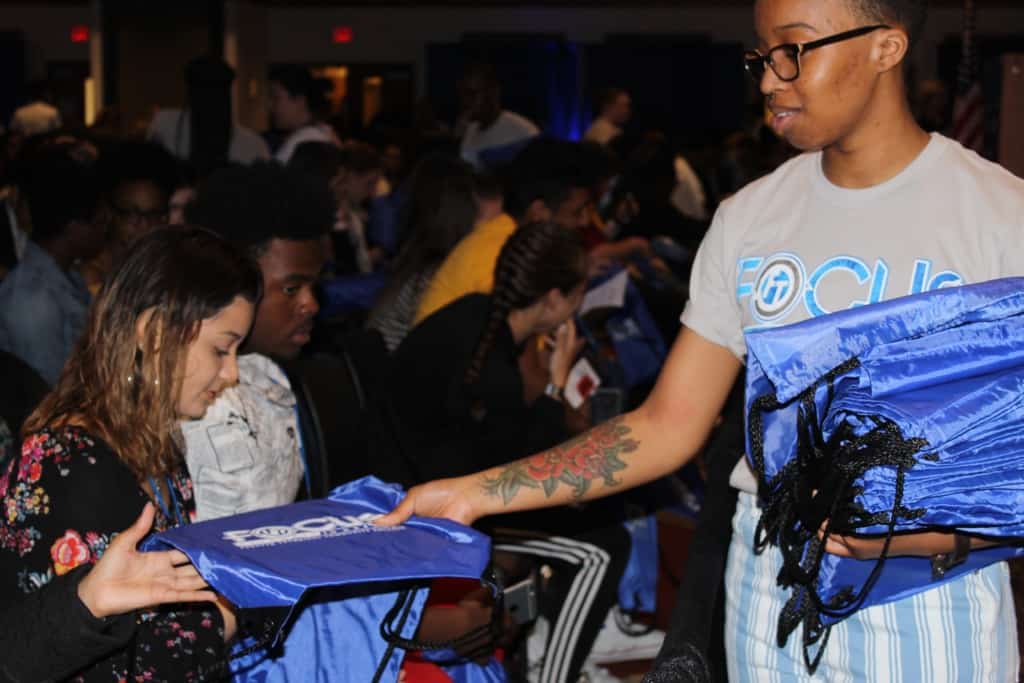

On a Friday afternoon with the sun shining and rain held at bay, roughly half of the so-called 41% poured out of buses and cars and into the Strickland Center for a welcome by Spriggs, Lowe, and others. From there, they split up and explored the college.
Some visited the cardiovascular sonography program, where students study physics, human anatomy, physiology, and pathology en route to becoming skilled at obtaining high quality sonographic images. Afterward, one student turned to the dean of that program and said: “I’m so excited. Now I know what my future looks like.”
Others visited the radiography center and saw how X-rays are taken.
One student walked out and, within earshot of Spriggs, said: “This. Is. So. Cool.”
Spriggs turned and pointed to the X-ray area. “This is? Do you know what you’re going to be now?”
“I can’t decide,” the student responded. “There’s too many options.”
This is where community colleges specialize: Offering a variety of opportunities at a low cost so that students can explore options. Spriggs made sure the student got the message: “That’s okay,” she said. “Just come be a part of health technologies and we’ll find the right fit for you.”
Students also had the opportunity to tour the advanced manufacturing labs, the welding program and welding robot, the 3D printing lab, the cybersecurity center, and more.
“There is an energy here that we’ve not felt before,” Spriggs said.
A group of more than 100 high school students sat in the Rhoades Conference Room in the Strickland Center listening to Forsyth Tech students on a path to transferring to four-year programs. They heard about fears students had as the first in their families to attend post-secondary education. They talked about the help they get from advisors on things like charting a career path, managing their time, and choosing classes.
One of the panelists, Anna Hamacher, looked directly at the crowd of high schoolers and minced no words: “I want you guys to know that you don’t have to compare yourself to what other people are doing, because you know what path you need to do — so just do it. You know what’s best for you.”
When Hamacher was a senior at Wesleyan Christian Academy in High Point, she remembers most of her friends talking about the four-year universities they would attend after graduation. She got caught up in that expectation as well, and researched and visited many four-year universities herself. But something did not feel right — she wasn’t comfortable with the setting and wasn’t ready to leave home yet. She was in the minority of her classmates, and some of her friends didn’t understand her decision to attend community college.
“They might look down on it,” she said, “But I don’t. I know what’s best for me. I get to come here for my associate’s degree and I get to save money at the same time. And I still get home-cooked meals.
Those at the four-year colleges, I don’t know if they know what they’re doing. But when you come here, you have more time and you get to experience other stuff. You still get to have the college experience and you still get to have fun and your teachers are still great and you still get to meet a lot of great people.”
For Hamacher, she figured out while at Forsyth Tech that she wants to become an occupational therapist. She has one more year in her associate degree and then plans to finish her bachelor’s degree at UNC Greensboro. Her fellow panelist, Deidra Garner, is a 35-year-old wife and mother of three who works nights while attending Forsyth Tech.
“I graduated in 2002, and it was you’re going to [a four-year] college or you’re going to work — that’s all I got,” she said. “My family didn’t really push the issue so I went to work. It took me until I was 25 or 26 to realize that I needed to be in college. But if I would have had a program like this one today, to be able to talk to people and have someone to guide me, I probably would have gone straight to college.”
The kind of impact Garner is talking about was evident walking around the event. As the day marched on, a computer lab set up for students interested in starting the application process began to fill up.
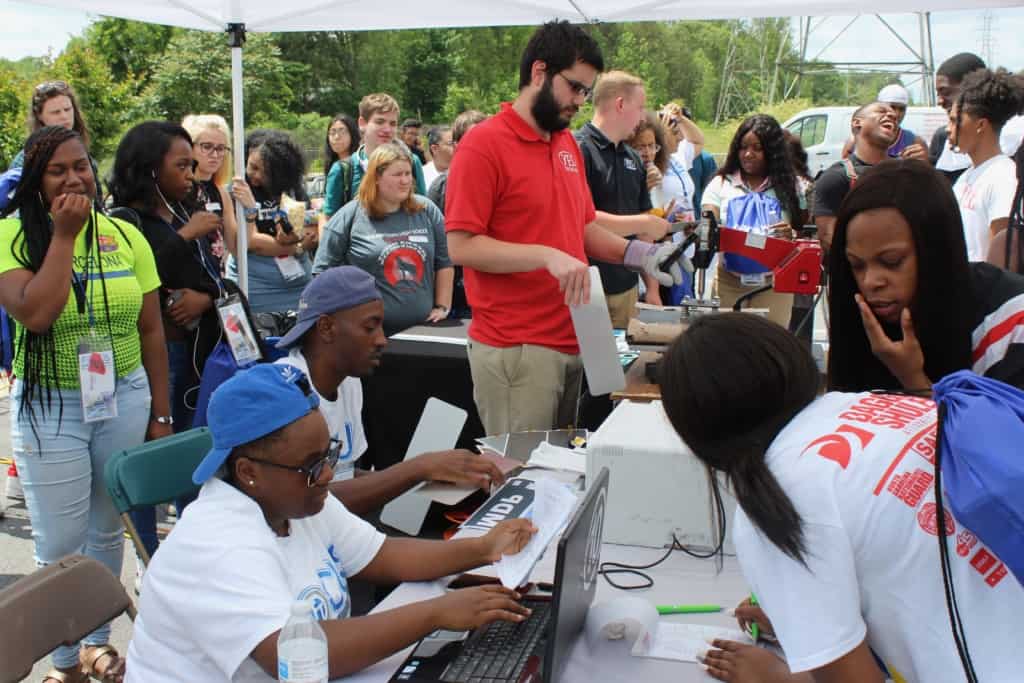

Outside, the college put together a “campus experience” where students could visit tables for the dozens of programs available at Forsyth Tech. There was a tent with long lines of students waiting to get personalized signs and an area for hamburgers, hot dogs, popcorn, and cotton candy. And, there was camaraderie — hundreds of complete strangers walking around, bumping into one another, and stopping to talk.
One of the students was Aaron Leo Sexton. He hadn’t given too much thought to postsecondary education. He harbored dreams of working in the military, and he didn’t think his grades would get him into a four-year college. At Focus on Forsyth, he spent time in the cybersecurity program.
“It was the most amazing room I’ve ever been in,” he said afterward.
As he spoke to instructors and administrators, a path from community college to four-year university to the Air Force started to take shape. In one afternoon, he found clarity around his future.
It’s helping people like Sexton and the 700-plus others to become aware of the accessible and affordable post-secondary opportunities in their community that drives Spriggs and her team. Particularly for Spriggs, for whom this work is personal.
“I think that coming from a low-income background, I understand that no matter how much my parents loved me and wanted me to be whatever I wanted to be, they couldn’t help me create a pathway to get there,” Spriggs said. “But we can. And so if we can get the students here, and we can be a role model, and we can explain to them what the opportunities are and connect with the programs and with the business leaders, that’s what’s going to generate the excitement and help them understand they can do something different than they ever thought.”


